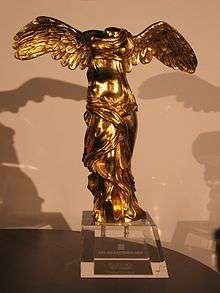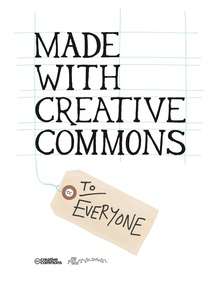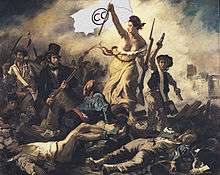Creative Commons
|
| |
| Founded | January 15, 2001[1] |
|---|---|
| Founder | Lawrence Lessig |
| Type | 501(c)(3) |
| 04-3585301 | |
| Focus | Expansion of "reasonable", flexible copyright |
| Method | Creative Commons license |
Key people | Ryan Merkley (CEO) |
| Website |
creativecommons |
Creative Commons (CC) is an American non-profit organization devoted to expanding the range of creative works available for others to build upon legally and to share.[2] The organization has released several copyright-licenses known as Creative Commons licenses free of charge to the public. These licenses allow creators to communicate which rights they reserve, and which rights they waive for the benefit of recipients or other creators. An easy-to-understand one-page explanation of rights, with associated visual symbols, explains the specifics of each Creative Commons license. Creative Commons licenses do not replace copyright, but are based upon it. They replace individual negotiations for specific rights between copyright owner (licensor) and licensee, which are necessary under an "all rights reserved" copyright management, with a "some rights reserved" management employing standardized licenses for re-use cases where no commercial compensation is sought by the copyright owner. The result is an agile, low-overhead and low-cost copyright-management regime, benefiting both copyright owners and licensees.
The organization was founded in 2001 by Lawrence Lessig, Hal Abelson, and Eric Eldred[3] with the support of Center for the Public Domain. The first article in a general interest publication about Creative Commons, written by Hal Plotkin, was published in February 2002.[4] The first set of copyright licenses was released in December 2002.[5] The founding management team that developed the licenses and built the Creative Commons infrastructure as we know it today included Molly Shaffer Van Houweling, Glenn Otis Brown, Neeru Paharia, and Ben Adida.[6]
In 2002 the Open Content Project, a 1998 precursor project by David A. Wiley, announced the Creative Commons as successor project and Wiley joined as CC director.[7][8] Aaron Swartz played a role in the early stages of Creative Commons,[9] as did Matthew Haughey.[10]
As of May 2018 there were an estimated 1.4 billion works licensed under the various Creative Commons licenses.[11] Wikipedia uses one of these licenses.[12] As of May 2018, Flickr alone hosts over 415 million Creative Commons licensed photos.[13][14]
Creative Commons is governed by a board of directors. Their licenses have been embraced by many as a way for creators to take control of how they choose to share their copyrighted works.
Purpose and goal

.jpg)




Creative Commons has been described as being at the forefront of the copyleft movement, which seeks to support the building of a richer public domain by providing an alternative to the automatic "all rights reserved" copyright, and has been dubbed "some rights reserved".[15] David Berry and Giles Moss have credited Creative Commons with generating interest in the issue of intellectual property and contributing to the re-thinking of the role of the "commons" in the "information age". Beyond that, Creative Commons has provided "institutional, practical and legal support for individuals and groups wishing to experiment and communicate with culture more freely."[16]
Creative Commons attempts to counter what Lawrence Lessig, founder of Creative Commons, considers to be a dominant and increasingly restrictive permission culture. Lessig describes this as "a culture in which creators get to create only with the permission of the powerful, or of creators from the past."[17] Lessig maintains that modern culture is dominated by traditional content distributors in order to maintain and strengthen their monopolies on cultural products such as popular music and popular cinema, and that Creative Commons can provide alternatives to these restrictions.[18][19]
Creative Commons Network
Until April 2018 Creative Commons had over 100 affiliates working in over 75 jurisdictions to support and promote CC activities around the world.[20] In 2018 this affiliate network has been restructured into a network organisation.[21] The network no longer relies on affiliate organisation but on individual membership organised in Chapter.
South Korea
Creative Commons Korea (CC Korea) is the affiliated network of Creative Commons in South Korea. In March 2005, CC Korea was initiated by Jongsoo Yoon (in Korean: 윤종수), a Presiding Judge of Incheon District Court, as a project of Korea Association for Infomedia Law (KAFIL). The major Korean portal sites, including Daum and Naver, have been participating in the use of Creative Commons licences. In January 2009, the Creative Commons Korea Association was consequently founded as a non-profit incorporated association. Since then, CC Korea has been actively promoting the liberal and open culture of creation as well as leading the diffusion of Creative Common in the country.
Bassel Khartabil
Bassel Khartabil was a Palestinian Syrian open source software developer and has served as project lead and public affiliate for Creative Commons Syria.[24] From March 15, 2012 he was detained by the Syrian government in Damascus at Adra Prison. On October 17, 2015 Creative Commons Board of Directors approved a resolution calling for Bassel Khartabil's release.[25] In 2017 Bassel's wife received confirmation that Bassel had been executed shortly after she lost contact with him in 2015.[26]
Criticism
All current CC licenses (except the CC0 Public Domain Dedication tool) require attribution, which can be inconvenient for works based on multiple other works.[27] Critics feared that Creative Commons could erode the copyright system over time[28] or allow "some of our most precious resources – the creativity of individuals – to be simply tossed into the commons to be exploited by whomever has spare time and a magic marker."[29]
Critics also worried that the lack of rewards for content producers will dissuade artists from publishing their work, and questioned whether Creative Commons is the commons that it purports to be.[30]
Creative Commons founder Lawrence Lessig countered that copyright laws have not always offered the strong and seemingly indefinite protection that today's law provides. Rather, the duration of copyright used to be limited to much shorter terms of years, and some works never gained protection because they did not follow the now-abandoned compulsory format.[31]
The maintainers of Debian, a GNU and Linux distribution known for its rigid adherence to a particular definition of software freedom,[32] rejected the Creative Commons Attribution License prior to version 3 as incompatible with the Debian Free Software Guidelines (DFSG) due to the license's anti-DRM provisions (which might, due to ambiguity, be covering more than DRM) and its requirement that downstream users remove an author's credit upon request from the author.[33] Version 3.0 of the Creative Commons licenses addressed these concerns[34] and except for the non commercial variants are considered to be compatible with the DFSG.[35]
Kent Anderson, writing for The Scholarly Kitchen, a blog of the Society for Scholarly Publishing, criticizes CC as being dependent on copyright and not really departing from it, and as being more complex and complicating than the latter – thus the public does not scrutinize CC, reflexively accepting it as one would a software license – while at the same time weakening the rights provided by copyright. Anderson ends up concluding that this is the point, and that "Creative Commons receives significant funding from large information companies like Google, Nature Publishing Group, and RedHat", and that Google money is especially linked to CC's history; for him, CC is "an organization designed to promulgate the interests of technology companies and Silicon Valley generally".[36]
License proliferation and incompatibility
Mako Hill asserted that Creative Commons fails to establish a "base level of freedom" that all Creative Commons licenses must meet, and with which all licensors and users must comply. "By failing to take any firm ethical position and draw any line in the sand, CC is a missed opportunity. ... CC has replaced what could have been a call for a world where 'essential rights are unreservable' with the relatively hollow call for 'some rights reserved.'" He also argued that Creative Commons worsens license proliferation, by providing multiple licenses that are incompatible.[37]
The Creative Commons website states, "Since each of the six CC licenses functions differently, resources placed under different licenses may not necessarily be combined with one another without violating the license terms."[38] Works licensed under incompatible licenses may not be recombined in a derivative work without obtaining permission from the copyright owner.[39][40][41]
Richard Stallman of the FSF stated in 2005 that he couldn't support Creative Commons as an activity because "it adopted some additional licenses which do not give everyone that minimum freedom", that freedom being "the freedom to share, noncommercially, any published work".[42] Those licenses have since been retired by Creative Commons.[43]
License misuse

Creative Commons is only a service provider for standardized license text, not a party in any agreement. Abusive users can brand the copyrighted works of legitimate copyright holders with Creative Commons licenses and re-upload these works to the internet. No central database of Creative Commons works is controlling all licensed works and the responsibility of the Creative Commons system rests entirely with those using the licences.[44] This situation is, however, not specific to Creative Commons. All copyright owners must individually defend their rights and no central database of copyrighted works or existing license agreements exists. The United States Copyright Office does keep a database of all works registered with it, but absence of registration does not imply absence of copyright.
Although Creative Commons offers multiple licenses for different uses, some critics suggested that the licenses still do not address the differences among the media or among the various concerns that different authors have.[30]
Lessig wrote that the point of Creative Commons is to provide a middle ground between two extreme views of copyright protection – one demanding that all rights be controlled, and the other arguing that none should be controlled. Creative Commons provides a third option that allows authors to pick and choose which rights they want to control and which they want to grant to others. The multitude of licenses reflects the multitude of rights that can be passed on to subsequent creators.[31]
Criticism of the non-commercial license
Erik Möller raised concerns about the use of Creative Commons' non-commercial license. Works distributed under the Creative Commons Non-Commercial license are not compatible with many open-content sites, including Wikipedia, which explicitly allow and encourage some commercial uses. Möller explained that "the people who are likely to be hurt by an -NC license are not large corporations, but small publications like weblogs, advertising-funded radio stations, or local newspapers."[45]
Lessig responded that the current copyright regime also harms compatibility and that authors can lessen this incompatibility by choosing the least restrictive license.[46] Additionally, the non-commercial license is useful for preventing someone else from capitalizing on an author's work when the author still plans to do so in the future.[46][47] The non-commercial licenses have also been criticized for being too vague about which uses count as "commercial" and "non-commercial".[48][49]
Great Minds, a non-profit educational publisher that released works under an -NC license, sued FedEx for violating the license because a school had used its services to mass-produce photocopies of the work, thus commercially exploiting the works. A U.S. judge dismissed the case in February 2017, ruling that FedEx was an intermediary, and that the provision of the license "does not limit a licensee's ability to use third parties in exercising the rights granted [by the licensor]."[50] Great Minds appealed the decision to the United States Court of Appeals for the Second Circuit later that year.[51] The 2nd Circuit upheld the lower court's decision in March 2018,[52] concluding that FedEx neither infringed copyrights nor violated the license. One of circuit judges Susan L. Carney argued in the court statement:
We hold that, in view of the absence of any clear license language to the contrary, licensees may use third‐party agents such as commercial reproduction services in furtherance of their own permitted noncommercial uses. Because FedEx acted as the mere agent of licensee school districts when it reproduced Great Minds' materials, and because there is no dispute that the school districts themselves sought to use Great Minds' materials for permissible purposes, we conclude that FedEx's activities did not breach the license or violate Great Minds' copyright.[53][54]
Personality rights
In 2007, Virgin Mobile Australia launched a bus stop advertising campaign which promoted its mobile phone text messaging service using the work of amateur photographers who uploaded their work to the photo-sharing site Flickr using a Creative Commons by Attribution license. Users licensing their images this way freed their work for use by any other entity, as long as the original creator was attributed credit, without any other compensation being required. Virgin upheld this single restriction by printing a URL, leading to the photographer's Flickr page, on each of their ads. However, one picture depicted 15-year-old Alison Chang posing for a photo at her church's fund-raising carwash, with the superimposed, mocking slogan "Dump Your Pen Friend".[55][56] Chang sued Virgin Mobile and Creative Commons. The photo was taken by Chang's church youth counsellor, Justin Ho-Wee Wong, who uploaded the image to Flickr under the Creative Commons license.[56]
The case hinges on privacy, the right of people not to have their likeness used in an ad without permission. So, while Mr. Wong may have given away his rights as a photographer, he did not, and could not, give away Alison's rights. In the lawsuit, which Mr. Wong is also a party to, there is an argument that Virgin did not honor all the terms of the nonrestrictive license.[56]
On 27 November 2007, Chang filed for a voluntary dismissal of the lawsuit against Creative Commons, focusing their lawsuit against Virgin Mobile.[57] The case was thrown out of court due to lack of jurisdiction and subsequently Virgin Mobile did not incur any damages towards the plaintiff.[58]
See also
References
- ↑ "CreativeCommons.org WHOIS, DNS, & Domain Info – DomainTools". WHOIS. Retrieved 2016-07-11.
- ↑ "Frequently Asked Questions". Creative Commons. 4 August 2016. Retrieved 20 December 2011.
- ↑ "Creative Commons: History". Retrieved 2011-10-09.
- ↑ Plotkin, Hal (11 February 2002). "All Hail Creative Commons / Stanford professor and author Lawrence Lessig plans a legal insurrection". SFGate.com. Retrieved 2011-03-08.
- ↑ "History of Creative Commons". Retrieved 2009-11-08.
- ↑ Haughey, Matt (2002-09-18). "Creative Commons Announces New Management Team". creativecommons.org. Retrieved 2013-05-07.
- ↑ Wiley, David A. (30 June 2003). "OpenContent is officially closed. And that's just fine". opencontent.org. Archived from the original on 2003-08-02. Retrieved 2016-02-21.
I'm closing OpenContent because I think Creative Commons is doing a better job of providing licensing options which will stand up in court.
- ↑ Creative Commons Welcomes David Wiley as Educational Use License Project Lead by matt on creativecommons.org (June 23rd, 2003)
- ↑ Lessig, Lawrence (2013-01-12). "Remembering Aaron Swartz". creativecommons.org. Retrieved 2013-05-07.
- ↑ "Matt Haughey - Creative Commons". Creative Commons. 2005-04-04. Retrieved 2018-01-11.
- ↑ "State of the Commons – Creative Commons 2017". stateof.creativecommons.org. Retrieved 2018-01-13.
- ↑ "Wikimedia Foundation Terms of Use". Retrieved June 11, 2012.
- ↑ "Flickr: Creative Commons". www.flickr.com. Retrieved 2018-01-16.
- ↑ "State of the Commons 2017". State of the Commons 2017. Retrieved 2018-05-09.
- ↑ Broussard, Sharee L. (September 2007). "The copyleft movement: creative commons licensing" (PDF). Communication Research Trends. Retrieved 2015-10-20.
- ↑ Berry, David (15 July 2005). "On the "Creative Commons": a critique of the commons without commonalty". Free Software Magazine. Retrieved 20 December 2011.
- ↑ Lessig, Lawrence (2004). Free Culture (PDF). New York: Penguin Press. p. 8. ISBN 1-59420-006-8. Retrieved 2015-10-20.
- ↑ Ermert, Monika (2004-06-15). "Germany debuts Creative Commons". The Register.
- ↑ Lessig, Lawrence (2006). "Lawrence Lessig on Creative Commons and the Remix Culture". Talking with Talis. Archived from the original (mp3) on 2008-02-05. Retrieved 2006-04-07.
- ↑ "CC Affiliate Network". Creative Commons. Retrieved 15 March 2015.
- ↑ The Creative Commons Network Strategy.
- ↑ "Creative Commons Korea". CCkorea.org. Retrieved 20 December 2011.
- ↑ "CC Asia Conference 2010". Creative Commons. 21 July 2010. Retrieved 20 December 2011.
- ↑ "Syria". creativecommons.org.
- ↑ Board of Directors approves resolution calling for Bassel Khartabil release – Creative Commons Blog. Creative Commons (2015-10-17). Retrieved on 2016-11-02.
- ↑ McKernan, Bethan (2 August 2017). "Bassel Khartabil Safadi dead: One of Syria's most famous activists has been executed in prison, widow confirms". The Independent.
- ↑ Paley, Nina (2010-03-04). "The Limits of Attribution". Nina Paley's Blog. Retrieved 2013-01-30.
- ↑ Dvorak, John (July 2005). "Creative Commons Humbug". PC Magazine.
- ↑ Schaeffer, Maritza (2009). "Note and Comment: Contemporary Issues in the Visual Art Realm: How Useful are Creative Commons Licenses?" (PDF). Journal of Law and Policy. Archived from the original (PDF) on 2016-02-04. Retrieved 2015-10-20.
- 1 2 Elkin-Koren, Niva (2006). "Exploring Creative Commons: A Skeptical View of a Worthy Pursuit". The Future of the Public Domain (P. Bernt Hugenholtz and Lucie Guibault, eds.). SSRN 885466. Missing or empty
|url=(help);|access-date=requires|url=(help) - 1 2 Lessig, Lawrence (2004). "The Creative Commons". 65 Mont. L. Rev. 1. Missing or empty
|url=(help) - ↑ Prodromou, Evan (3 April 2005). "Summary of Creative Commons 2.0 Licenses". debian-legal (mailing list). Archived from the original on 19 May 2006.
- ↑ Garlick, Mia (2007-02-23). "Version 3.0 Launched". Creative Commons. Retrieved 2007-07-05.
- ↑ "The DFSG and Software Licenses – Creative Commons Share-Alike (CC-SA) v3.0". Debian Wiki. Retrieved 2009-03-16.
- ↑ Anderson, Kent (April 2, 2014). "Does Creative Commons Make Sense?". The Scholarly Kitchen. Society for Scholarly Publishing. Retrieved December 21, 2017.
- ↑ Hill, Benjamin Mako (29 July 2005). "Towards a Standard of Freedom: Creative Commons and the Free Software Movement".
- ↑ "CC Learn Explanations: Remixing OER: A guide to License Compatibility" (PDF). Creative Commons CC Learn. Archived from the original (PDF) on 25 October 2009. Retrieved 29 November 2010.
- ↑ "Can I combine two different Creative Commons licensed works? Can I combine a Creative Commons licensed work with another non-CC licensed work?". FAQ. Creative Commons. Retrieved 16 September 2009.
- ↑ Stallman, Richard M. "Fireworks in Montreal". FSF Blogs. Retrieved 18 November 2009.
- ↑ "NonCommercial 1.0 Generic (CC NC 1.0)". Creative Commons. Retrieved 13 November 2015.
- ↑ Orlowski, Andrew (July 2009). "The Tragedy of the Creative Commons".
- ↑ Moeller, Erik (2006). "The Case for Free Use: Reasons Not to Use a Creative Commons -NC License" (PDF). Open Source Jahrbuch.
- 1 2 Lessig, Lawrence (2005). "CC in Review: Lawrence Lessig on Important Freedoms". Creative Commons. Retrieved 2015-10-20.
- ↑ "On Free, and the Differences between Culture and Code" (video). 23C3 Who can you trust?. 2006. google video docid=7661663613180520595. Retrieved 2014-02-07.
- ↑ Haff, Gordon (2007-11-26). "Does the Noncommercial Creative Commons license make sense?". CNET. Retrieved 2015-02-22.
- ↑ Prodromou, Evan (2005-04-19). "Use cases for NonCommercial license clause". cc-licenses mailing list. Retrieved 2015-02-22.
- ↑ "Odd lawsuit fails to ding FedEx for allowing copies of CC-licensed material". Ars Technica. Retrieved 27 February 2017.
- ↑ Cavanagh, Sean (July 20, 2017). "Open Ed. Provider Appealing Decision in Closely Watched Lawsuit". EdWeek Market Brief. Editorial Projects in Education, Inc. Retrieved March 23, 2018.
- ↑ Vogt, RJ (March 21, 2018). "2nd Circ. Upholds FedEx Win In Textbook Copying Suit". Law360. Retrieved March 23, 2018.
- ↑ Klasfeld, Adam (March 21, 2018). "Second Circuit Clears FedEx in Education Copyright Case". Courthouse News Service. Retrieved March 23, 2018.
- ↑ Great Minds v. FedEx Office and Print Services, Inc. (2d Cir. March 21, 2018). Text
- ↑ "Lawsuit over Virgin Mobile's use of Flickr girl blames Creative Commons". Out-law.com. 2007-09-25. Retrieved 2013-05-23.
- 1 2 3 Cohen, Noam (2007-10-01). "Use My Photo? Not Without Permission". The New York Times. Retrieved 2013-07-24.
One moment, Alison Chang, a 15-year-old student from Dallas, is cheerfully goofing around at a local church-sponsored car wash, posing with a friend for a photo. Weeks later, that photo is posted online and catches the eye of an ad agency in Australia, and the altered image of Alison appears on a billboard in Adelaide as part of a Virgin Mobile advertising campaign.
- ↑ Gross, Grant (2007-12-01). "Lawsuit Against Creative Commons Dropped". PC World. Retrieved 2008-05-25.
- ↑ LaVine, Lindsay (2012-12-20). "Use Photos in Advertisements? Take These Steps to Avoid a Lawsuit". NBC News. Retrieved 2013-07-24.
Bibliography
- Ardito, Stephanie C. (2003). "Public-Domain Advocacy Flourishes". Information Today. 20 (7): 17, 19.
- Asschenfeldt, Christiane. "Copyright and Licensing Issues—The International Commons." In CERN Workshop Series on Innovations in Scholarly Communication: Implementing the Benefits of OAI (OAI3), 12–14 February 2004 at CERN, Geneva, Switzerland. Geneva: CERN, 2004. (video)
- Brown, Glenn Otis. "Academic Digital Rights: A Walk on the Creative Commons." Syllabus Magazine (April 2003).
- "Out of the Way: How the Next Copyright Revolution Can Help the Next Scientific Revolution." PLoS Biology 1, no. 1 (2003): 30–31.
- Chillingworth, Mark. "Creative Commons Attracts BBC's Attention." Information World Review, 11 June 2004.
- Conhaim, Wallys W. "Creative Commons Nurtures the Public Domain." Information Today 19, no. 7 (2002): 52, 54.
- "Delivering Classics Resources with TEI-XML, Open Source, and Creative Commons Licenses". Cover Pages. 28 April 2004.
- Denison, D.C. "For Creators, An Argument for Alienable Rights." Boston Globe, 22 December 2002, E2.
- Ermert, Monika (15 June 2004). "Germany Debuts Creative Commons". The Register.
- Fitzgerald, Brian, and Ian Oi. "Free Culture: Cultivating the Creative Commons." (2004).
- Hietanen, Herkko "The Pursuit of Efficient Copyright Licensing — How Some Rights Reserved Attempts to Solve the Problems of All Rights Reserved" (2008) PhD dissertation.
- Johnstone, Sally M. "Sharing Educational Materials Without Losing Rights." Change 35, no. 6 (2003): 49–51.
- Lessig, Lawrence (2003). "The Creative Commons". Florida Law Review. 55: 763–777.
- Möller Erik, The Case for Free Use: Reasons Not to Use a Creative Commons -NC License, in Open Source Jahrbuch 2006.
- Plotkin, Hal (11 February 2002). "All Hail Creative Commons: Stanford Professor and Author Lawrence Lessig Plans a Legal Insurrection". SFGate.
- Richard, Phillip, "Copyright Inefficiency", Music Business Journal, Berklee College of Music (Oct. 2012)
- Schloman, Barbara F. (13 October 2003). "Creative Commons: An Opportunity to Extend the Public Domain". Online Journal of Issues in Nursing. Archived from the original on October 22, 2003.
- Stix, Gary (March 2003). "Some Rights Reserved". Scientific American. 288 (3): 46. doi:10.1038/scientificamerican0303-46. Archived from the original on 2005-09-15.
- Weitzman, Jonathan B., and Lawrence Lessig. "Open Access and Creative Common Sense." Open Access Now, 10 May 2004.
- Till Kreutzer: Open Content – A Practical Guide to Using Creative Commons Licences, Deutsche UNESCO-Kommission e. V., Hochschulbibliothekszentrum Nordrhein-Westfalen, Wikimedia Deutschland e. V. 2015.